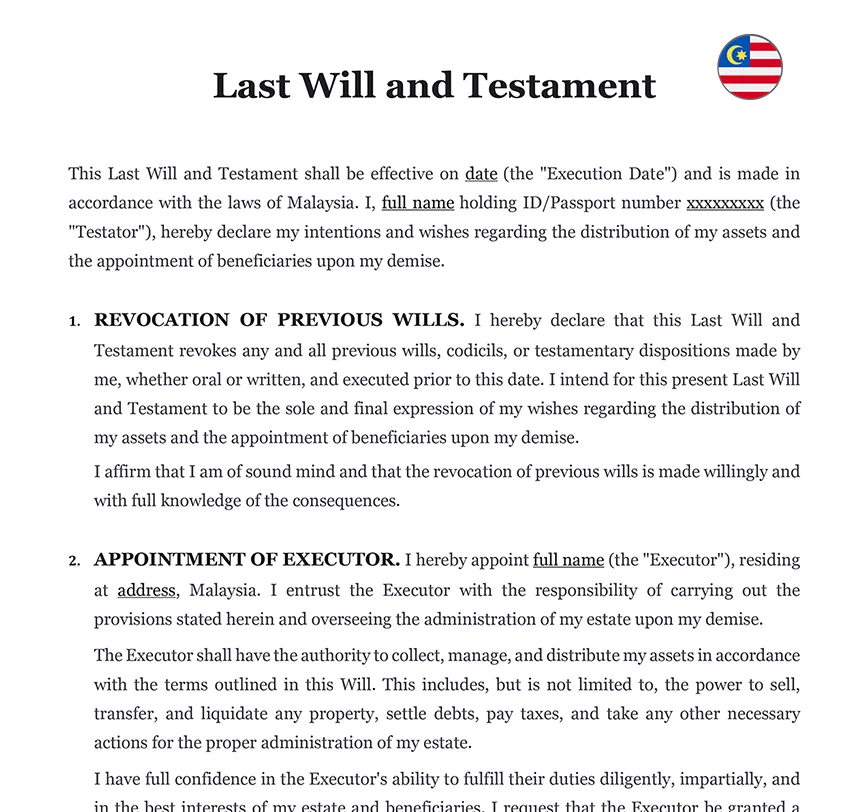Ready to use legal template
Drafted by experienced lawyers
Compliant with Malaysian law
Ready to use legal template
Drafted by lawyers
Compliant with Malaysian law
Home › Family law › Testament
Learn more about Testament in Malaysia
A testament document, commonly known as a will, is a legally binding document that outlines a person’s wishes regarding the distribution of their assets and the appointment of guardians for minor children after their death. It serves as a means to ensure that one’s estate is managed and distributed according to their desires, providing clarity and guidance to family members and beneficiaries. Themis Partner offers you an easy to edit Testament drafted by lawyers to comply with the law in Malaysia.
Table of contents
What is a testament?
A testament in Malaysia refers to a legally binding document that outlines a person’s wishes and instructions regarding the distribution of their assets and properties after their death. It is commonly known as a will. A testament serves as a crucial tool in estate planning, allowing individuals to have control over the disposition of their assets and to provide for their loved ones according to their wishes. In Malaysia, the content and validity of a testament may be governed by different laws depending on the individual’s religious affiliation. For non-Muslims, the Law Reform (Marriage and Divorce) Act 1976 governs the requirements and procedures for creating a valid testament, while Muslims may follow the principles of Islamic law. In Malaysia, the document ensures that the testator’s intentions are respected, providing clarity and guidance for the proper distribution of assets upon their demise.
What is the purpose of a testament estate planning?
The purpose of a testament in estate planning is to establish a clear and legally binding document that outlines an individual’s wishes regarding the distribution of their assets and the handling of their affairs after their death. Estate planning involves making arrangements to ensure that one’s assets are managed and transferred according to their intentions, while also considering the welfare of their loved ones. By creating a testament, individuals can specify who will inherit their property, appoint guardians for minor children, name an executor to administer their estate, and make provisions for special circumstances or specific bequests. It serves as a vital tool in providing peace of mind, ensuring that one’s assets are distributed as desired, minimising conflicts among family members, and preserving the financial well-being of future generations.
What should it include?
1. Identification
The testament should start with the testator’s personal information, including their full name, address, and any relevant identification numbers.
2. Appointment of Executor
The testator should appoint an executor, who will be responsible for administering the estate and ensuring the distribution of assets according to the testament’s instructions.
3. Asset Distribution
The document should clearly outline how the testator wishes their assets, including properties, investments, bank accounts, and personal belongings, to be distributed among the beneficiaries. Specific bequests, such as sentimental items or charitable donations, should be included as well.
4. Appointment of Guardians
If the testator has minor children, the document should designate guardians who will have the responsibility of caring for and raising the children in the event of the testator’s death.
5. Contingency Plans
It is advisable to include contingency plans, such as alternate beneficiaries or guardians, in case the primary choices are unable or unwilling to fulfill their roles.
6. Revocation of Previous Wills
The testator may want to expressly revoke any previous wills or testamentary documents to ensure that the current testament takes precedence.
7. Signature and Witness Requirements
The document must be signed by the testator in the presence of witnesses who are not beneficiaries or potential beneficiaries. It should include the signatures of the witnesses as well.
What are the implications of not having a testament?
Not having a testament, or a will, can have significant implications for the distribution of assets and the handling of one’s affairs after their death.
1. Without it, a person’s assets will be distributed according to the intestacy laws of the jurisdiction in which they reside. These laws typically prioritise spouses, children, and other close relatives as beneficiaries in a predetermined order.
2. The lack of a testament can result in assets being divided in a manner that may not align with the individual’s preferences or intentions.
3. It can also lead to delays and complications in the probate process, as the court will need to appoint an administrator to handle the estate.
4. Additionally, without it, there is no provision for specific bequests, appointment of guardians for minor children, or considerations for unique family circumstances or charitable donations.
5. By not having this document, individuals relinquish the opportunity to have control over their assets, potentially causing difficulties and disputes among family members and beneficiaries.
Can a testament be challenged or contested?
Yes, it can be challenged or contested in Malaysia under certain circumstances. The Law Reform (Marriage and Divorce) Act 1976 provides provisions for contesting a will in the civil courts. Some common grounds for challenging a testament include allegations of lack of testamentary capacity, undue influence, fraud, forgery, or improper execution of the will. Interested parties, such as beneficiaries or individuals who would have had an interest in the estate had the will been declared invalid, may file a legal claim to challenge the testament. The court will carefully examine the evidence and arguments presented by both parties before making a decision. It is important to note that the burden of proof lies with the party challenging the will.
How can a testament be amended or revoked?
It can be amended or revoked in Malaysia through specific legal procedures. To amend it, the testator may execute a new will that expressly revokes the previous will and includes the desired changes. It is essential to follow the formalities required by law, such as signing the new will in the presence of witnesses. Alternatively, the testator may choose to create a codicil, which is a separate document that modifies certain provisions of the existing will without revoking the entire document. A codicil must be executed with the same formalities as a will. To revoke a testament, the testator may intentionally destroy the document, make a written declaration of revocation, or execute a subsequent will that explicitly revokes the previous will. It is important to note that any changes or revocations should be made with careful consideration.
How are executors and trustees appointed?
Executors and trustees are appointed in Malaysia through specific legal procedures outlined in the document.
The testator, or the person creating the will, designates the individuals they wish to appoint as executors and trustees to carry out their wishes and manage their estate after their death.
Executors are responsible for administering the estate, which includes tasks such as gathering and valuing assets, paying debts and taxes, and distributing the estate according to the provisions of the will.
Trustees, on the other hand, are responsible for managing any trusts established by the testator, which may involve holding and distributing assets for the benefit of specified beneficiaries over a period of time.
The appointment of executors and trustees should be carefully considered, and individuals chosen for these roles should be trustworthy, responsible, and capable of fulfilling their duties.
Last Will and TestamentDrafting
Ask our family law experts to draw up your own tailor-made contract
Share information
Why Themis Partner ?
Make documents forhundreds of purposes
Hundreds of documents
Instant access to our entire library of documents for Malaysia.
24/7 legal support
Free legal advice from our network of qualified lawyers.
Easily customized
Editable Word documents, unlimited revisions and copies.
Legal and Reliable
Documents written by lawyers that you can use with confidence.




